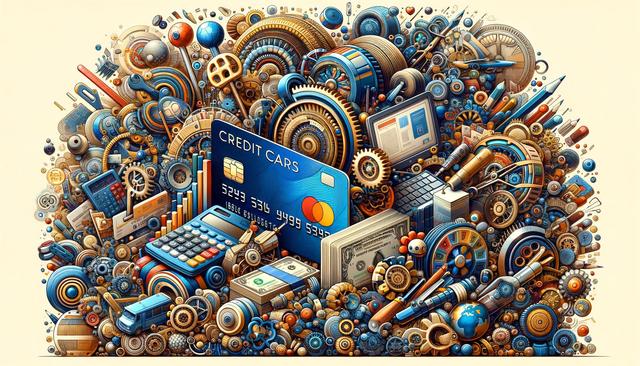Understanding How Credit Cards Work
Credit cards function as a form of revolving credit, allowing users to make purchases up to a certain limit and repay the balance over time. When used responsibly, they can be powerful financial tools. Each credit card comes with a set of terms, including the interest rate (APR), credit limit, and billing cycle. Understanding these components helps cardholders manage their spending and avoid unnecessary fees. Additionally, timely payments contribute to building a positive credit history, which is essential for future financial decisions such as loans or mortgages.
Most credit cards offer a grace period during which no interest is charged if the balance is paid in full by the due date. However, carrying a balance beyond this period may result in interest charges. It’s important to review the fine print and fully understand the repayment terms to avoid potential pitfalls. Responsible credit card use involves keeping balances low relative to the credit limit and making at least the minimum payment by the due date.
Exploring Everyday Credit Card Options
When selecting a credit card for everyday use, individuals should consider how they typically spend and what features would benefit them most. Various cards are designed to cater to specific spending habits, such as groceries, gas, or online shopping. Some cards offer straightforward cashback rates on all purchases, while others provide higher rewards in select categories. Evaluating personal spending patterns can help determine which card structure is more rewarding for daily expenses.
Common features of credit cards for everyday use include:
- Flat-rate cashback on all purchases
- Bonus categories for recurring expenses like groceries or transportation
- No annual fee options
- Mobile payment compatibility and security features
In addition to rewards, practical considerations such as customer service availability, fraud protection, and digital tools for tracking spending should play a role in card selection. A card that aligns with one’s lifestyle not only simplifies day-to-day purchases but can also generate value through rewards or discounts over time.
Benefits Beyond Purchases
Many credit cards offer perks that go beyond the basic function of making purchases. These added benefits can enhance the overall value of a card, especially for those who take advantage of them regularly. For instance, some cards provide travel-related protections like rental car insurance, trip cancellation coverage, and no foreign transaction fees. Others include purchase protections such as extended warranties and return assistance.
Additional advantages may include:
- Access to exclusive discounts or promotions
- Free credit score monitoring
- Fraud alerts and zero-liability protection
- Online account management and budgeting tools
These features can contribute to a more secure and rewarding financial experience. For consumers who travel frequently or shop online, these protections and services offer peace of mind and potentially significant savings. Carefully reviewing the list of included benefits can help users get more out of their credit card.
Managing Credit Card Use Responsibly
Responsible credit card use is critical to maintaining financial health and maximizing the card’s advantages. The key to effective management is developing habits that support timely repayment and mindful spending. Setting up automatic payments, monitoring account activity regularly, and staying within a budget are foundational practices. These steps help avoid interest charges, late fees, and adverse impacts on one’s credit score.
Tips for responsible usage include:
- Paying more than the minimum payment when possible
- Keeping utilization below 30% of the credit limit
- Reviewing monthly statements for accuracy
- Using alerts to track spending and due dates
Over time, consistent responsible behavior can lead to higher credit limits and eligibility for more favorable credit offers. It’s also a good idea to periodically reassess whether the current card meets evolving financial needs or if a different option would be more suitable.
Choosing the Right Card for Long-Term Use
Selecting a credit card isn’t only about current rewards—it’s also about how it fits into one’s long-term financial goals. For example, someone looking to improve their credit score may prioritize a card with strong reporting to credit bureaus and no annual fee. Others may seek cards that offer travel rewards or partner with popular retailers for added incentives. By aligning the card’s features with future plans, users can ensure that their card continues to serve them well as life circumstances change.
Factors to consider when thinking long-term include:
- Whether the rewards structure matches shifting spending habits
- The potential to upgrade to a more rewarding card with the same issuer
- Changes in lifestyle, such as increased travel or family expenses
- Interest rates and balance transfer options in case of larger purchases
Taking a strategic approach to credit card selection helps ensure that the card remains a valuable tool over time, rather than a short-term solution. It’s worth revisiting card benefits periodically to confirm they still provide meaningful value and to compare them against new options available on the market.
Conclusion: Making Credit Cards Work for You
Credit cards can be highly effective tools for managing everyday expenses, earning rewards, and building credit when used wisely. By understanding how credit cards work, exploring options tailored to daily use, and taking advantage of additional benefits, consumers can make informed decisions that support both short-term convenience and long-term financial health. Responsible use and periodic review of card features ensure that the card remains aligned with individual needs and preferences. Whether you’re new to credit or looking to optimize your current setup, a thoughtful approach to credit card use can provide lasting value and financial flexibility.




Leave a Reply